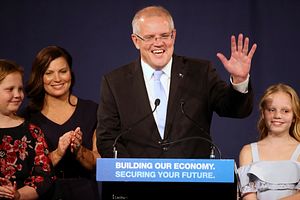“I have always believed in miracles,” Australian Prime Minister Scott Morrison declared Saturday evening, after securing a shock election victory for his ruling Liberal-National Coalition government.
After consistently trailing in opinion polls, rebuilding his center-right party from the trauma of another leadership coup barely nine months earlier, and suffering a string of exits of high-profile ministers and various scandals, the Liberal leader had achieved a seemingly miraculous comeback.
For two years, opinion polls had the opposition center-left Labor party poised to regain power, with exit polls pointing to a 52 to 48 percent margin.
So sure was betting agency Sportsbet of a Labor victory that it paid out more than A$1.3 million (US$900,000) to punters two days before the Saturday poll. At one stage, odds on the Coalition defeating Labor had climbed as high as A$7.50 for every dollar gambled.
Confident of victory after the Liberal party’s leadership dramas, Labor leader Bill Shorten had mapped out a seemingly ambitious agenda for office. His “Fair Go Action Plan” included increased spending on hospitals, schools, and public transport while pledging a 50 percent renewable energy target by 2030 as well as wage hikes for workers.
Shorten vowed to pay for his promises through higher taxes on “the top end of town,” including increased taxes on capital gains and reduced concessions for self-funded retirees and property investors.
In contrast, Morrison’s party vowed to “keep our economy strong, to keep Australians, safe and to keep Australians together.” It pledged to create more jobs, reduce public debt and cut taxes while attacking Labor for its reported A$387 billion extra tax burden.
“Labor’s Housing Tax would hit property values, increase rents, and hurt Australia’s economy. Labor’s Retiree Tax would hit over one million Australians who work hard and save,” the Liberal party warned voters.
The contrast between the pro-environment, higher taxing and spending Labor party and the government’s economic focus gave Australian voters a clearer choice than in previous polls.
The election also had its share of wild cards, including the A$80 million campaign run by Queensland-based businessman Clive Palmer, whose United Australia Party adverts dominated the media, and right-wing maverick Pauline Hanson, who overcame scandals to top One Nation party officials involving strip clubs and an attempted tie-up with the U.S. National Rifle Association.
However, Shorten was still seen as the likely next prime minister, despite polls consistently showing Sydney-based Morrison as personally more popular than his Melbourne rival.
Late Saturday evening, however, it was Shorten calling Morrison to concede defeat rather than the other way around.
Admitting that the party faithful were hurting “and I am too,” the former trade union boss announced he would resign after nearly six years as Labor leader.
“This has been a tough campaign, toxic at times. But now that the contest is over all of us have a responsibility to respect the result, respect the wishes of the Australian people and to bring our nation together,” he said.
“However, that task will be one for the next leader of the Labor party.”
Analysts said Shorten had lost the “unlosable election” due to a range of factors, from Labor’s “class warfare” attacks on big business, to Shorten’s personal unpopularity, the impact of minor parties, and a scare campaign on taxes run by the government.
While Shorten’s home state of Victoria polled well for Labor, the party lost ground elsewhere, particularly in the northern state of Queensland, where it failed to win a single seat following divisions over a proposed new coal mine by Indian company Adani.
Labor was set to meet Wednesday to elect a new leader, with former Deputy Prime Minister Anthony Albanese seen as the most likely to replace Shorten after the withdrawal from the race of deputy leader Tanya Plibersek. Shadow finance minister Jim Chalmers was expected to challenge Albanese.
As of Monday evening local time, with 76 percent of the vote counted, the Coalition had won 75 seats in the 150-seat House of Representatives, with ABC News predicting it would secure a majority 77. Labor by contrast had won 65 seats, with other independents and Greens party accounting for another six.
The election also saw the defeat of former Prime Minister Tony Abbott, who lost his Sydney seat of Warringah to independent Zali Steggall after 25 years in office.
Financial markets welcomed the shock election victory, pushing the Australian dollar higher against the U.S. dollar and sending stocks to an 11-year high Monday, adding nearly A$33 billion to the Australian bourse.
“A Coalition win can be deemed a ‘surprise’ for investors and the upshot is that many tail risks that were potential consequences from what was a significant and wide-reaching tax and policy reform agenda from the ALP are now removed,” Morgan Stanley equity strategist Chris Nicol told the Australian Financial Review.
Congratulating the re-elected Morrison, U.S. President Donald Trump reportedly likened the shock result to his own presidential victory and Brexit.
Yet Morrison attributed his electoral support to the “quiet Australians” who worked hard and saved for retirement, resisting the “shouty” world of modern politics.
After recent global political shocks, the Coalition’s victory should have come as less of a surprise amid the apparent increasing unreliability of opinion polls. Fortunately for Morrison though, the avowed Christian’s belief in miracles proved well founded.
































